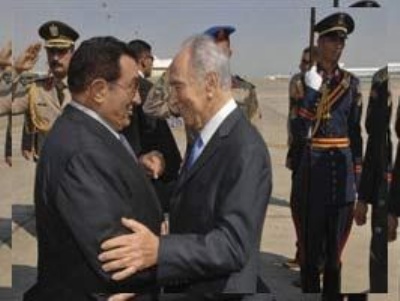
Firstly, after Damascus the convoy reached Amman after a long delay but Jordanian police did not allow it to enter Amman. Following a bitter bargaining the team was taken into the city. Whether or not Egypt would open the gate was highly debated and at the end Egypt decided to that it will allow the convoy's entrance. However 52 cars were awaited in Al-Arish Port and clashes occurred between the protestors and Egyptian police. After Jordan's action that is perceived as one of the betrayals of Arab countries to Palestinian cause that has examples in History, Egyptian police's attack against the convoy that carries humanitarian aid to Gaza people that is facing Israeli embargo, strengthened this perception. Egypt was already under criticism of Palestinians and their supporters due to its “iron wall” construction in Gaza border.
Various factors may have caused to this event that is perceived as betrayal to the Palestinian cause and is solved through the effort of Turkish Minister of Foreign Affairs Ahmet Davutoğlu.
Egypt is a country that turned its face to the West, namely to the US since 1978 Camp David Accords. Besides, Egypt that is the second country after Israel to receive American aid, is a country that got used to overcome its problems through American support. President Hosni Mubarak is planning to endorse his throne to his son. He needs the support of the US to carry out this transfer. Egypt needs this support to strengthen its decreasing regional role and situation. It cannot take the support of the US if it behaves contrarily to the interests of Israel. It attracts attention that this event has happened shortly after the visit of Israeli Prime Minister Benjamin Netanyahu. That is to say, Egypt's motivation to behave in such manner may be to get on well with Israel.
The real reason that lies behind the Egyptian behavior is Egypt's animosity towards Hamas. The animosity has strengthened after Hamas gained the control of Gaza. Egypt does not want a strong Hamas due to the threat of Muslim Brotherhood inside the country. Egypt that is losing its reputation and leadership role in the Middle East, has also been witnessing problematic developments in internal politics. While siding with Israel in the struggle against Hamas, Mobarek has been trying to suppress the Muslim Brotherhood in order to save his regime. The intention of Egypt to mediate Hamas-Fatah reconciliation talks and even leave the talks to abeyance, is to strengthen its position in the region. Egypt perceives the Palestinian issue as the only tool that will save it from losing its prestige in the region.
A more innocent explanation may be that Egypt attitude was motivated by the same reason of its as well as other Arab countries approach to the issue of Palestinian refugees. Arab countries, in order not to serve Israeli objective which is to melt Palestinian refugees into Arab population, do not grant citizenship to the refugees. Namely, Egypt may behave like that in order not to serve Israel's aim to leave the problems of Gaza and make it an extension of Egypt rather than a part of a potential Palestinian state. Egypt that mediates the reconciliation talks between Hamas and Fatah, may be thinking that its approach would benefit the Palestinians in the long-term.
Consequently, whatever the real intention is, Egypt seems to face isolation threat once again after Camp David in Arab public opinion.














